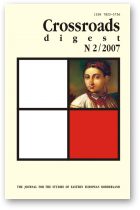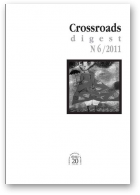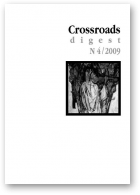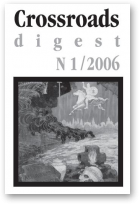- Home Page
- What’s New
- Books
- Audiobooks
- Periodicals
- Radio auditions
- Music
- Video
- Plans
- BHA’s Catalog
- EEDC’s Catalog
- Shop
- Skaryna’s Catalog
- MiOKB’s Catalog
- Private Catalog
- Belarusian Authors
- Belarusian publishers
- Publishing series
- Belarusan Emigration Collections
- Aphorisms
- Our banners
- About Us
- Partners
- Search/ Catalog
- News Archive

|

|
Crossroads Digest
The journal for the studies of Eastern European borderland
2/2007
Publication Place: Vilnius
Publication Date: 2007
Editor: Bobkov Igor
Editorial Staff: Dunaev Vladimir (Minsk), Naumova Svetlana (Minsk), Tereshkovich Pavel (Minsk), Bobkov Igor (editor-in-chief) (Minsk), Akudovich Valentin (editor) (Minsk), Zhurzhenko Tatyana (Kharkiv), Kozhokari Ljudmila (Kishineu)
Publisher: European Humanities University, Center for Advanced Studies and Education (CASE), the project «Social Transformations in the Borderland: Belarus, Ukraine, Moldova»
ISSN: 1822-5136
Copyright © 2007 by European Humanities University, Center for Advanced Studies and Education (CASE)
Book Collection: KAMUNIKAT — this site (online version)
Supplementary Data: Scientific Council: Anatoliy Mikhailov (Belarus), Doctor of Philosophy, Natalka Chernysh (Ukraine), Doctor of Social Sciences, Yaroslav Gritsak (Ukraine), Doctor of History, Virgiliu Birladyanu (Moldova), Doctor of History, Dmitri Karev (Belarus), Doctor of History, Dimitru Moldovan (Moldova), Doctor of Economy; EHU expresses its sincere gratitude for assistance and financial support of the project to Carnegie Corporation, New York.
A widespread interpretation of events in Ukraine in November-December 2004 is reflected upon in this article. The author uses the category of revolution to offer an alternative explanation of the events applying transitology that, in the author’s opinion, gives an opportunity to more correctly define the essence of these events as a stage of democratic transit. “The Orange Revolution” in the Ukrainian Public Political Discourse. A sharp rise in the political participation of Ukraine citizens in the last period of presidential election campaign in 2004, confrontation between the authorities and the opposition supported by hundreds of thousands of citizens with the epicenter of events in Independence Square in Kiev, the recognition by the Supreme Court of Ukraine of the second round of presidential elections void, the setting of the repeat voting and the victory of the oppositional candidate V. Yushchenko have already firmly established themselves in the consciousness of the majority of Ukrainians as “the Orange Revolution”.
Catalog: Kamunikat.org
Worth reading:
Crossroads Digest
The journal for the studies of Eastern European borderland
7
Radical social changes of the last decades detect more and more a failure of the established conceptual frameworks of knowledge in humanities and social sciences to “cope” with new social realities. In particular, the concept (and metaphor) of “grassroots society” draws a considerable amount of attention. While the obvious closeness of this concept with the concepts of “everydayness” and “privacy” is clear they are not identical. This a... More »
Crossroads Digest
8 / 2013
The paper studies several aspects of the “price of the issue” concerning the association with the EU for Ukraine and the Ukrainians. It shows the place of Ukraine in the geopolitical concepts of Russia, Poland, EU countries and the USA. The article claims that the issue of Ukraine’s European integration is of geopolitical nature and is solved not by the government of Ukraine but by the countries, which are the subjects of European geopo... More »
Crossroads Digest
The journal for the studies of Eastern European borderland
6
The reasons of the modernization inertia of the law-making process as a normative basis for the reformation of post-Soviet society are examined. The possibility and admissibility of social norm-making process in juridical reglamentation: harmonious combination of legal rules and other means of normative culture (morals, customs, traditions, ethics, corporate norms, etc.) based on the idea of the normative pluralism and the author’s conc... More »
Crossroads Digest
The journal for the studies of Eastern European borderland
5
he Chernobyl disaster has given rise to numerous analyses and reports, both scientiic and journalistic, as well as to ilms and documentaries.1 It has been the subject of widespread and unresolved debate as to the number of victims, current medical efects, and the impact of low-level radiation on people’s health. Above all perhaps it has relected a rit between what one might term “the scientiic community” and popular writing and inquir... More »
Crossroads Digest
The journal for the studies of Eastern European borderland
4
The biggest part of the territory made up by present Ukraine, Moldova and Belarus, earlier used to be the area of the Jewish settlement of the Russian empire. It is important to remember that the borders of the Jewish settlement at the turn of the 19th-20th centuries included Grodno, Minsk, Koven, Vitebsk, Mogilev, Vilno, Kherson, Volynsk, Bessarabia, Kiev, Podolsk, Poltava, Tauria, Ekaterinoslav, the Chernigov gubernia and ten gubernia... More »
Crossroads Digest
The journal for the studies of Eastern European borderland
3/2008
Ukraine and Belarus are the two countries which today constitute the main part of the strategically important “new” Eastern Europe. Since 2004 they have been sharing a common border with the European Union (the EU) and have become potential candidates for the EU membership. In the 1990s Ukraine and Belarus were commonly perceived as part of the “grey” zone between Russia and the EU and were believed to be in the sphere of Moscow’s legit... More »
Crossroads Digest
The journal for the studies of Eastern European borderland
1/2006
What kind of journal is it? “Crossroads Digest” is the selection of articles originally published in Russian in “Crossroads quarterly” in 2003—2006. “Crossroads quarterly” is a transdisciplinary scientific journal devoted to political, social and cultural transformations in the Eastern European borderland (Belarus, Moldova, Ukraine). The main tasks include assistance to conceptual and methodological renewal of academic research in the... More »














